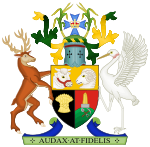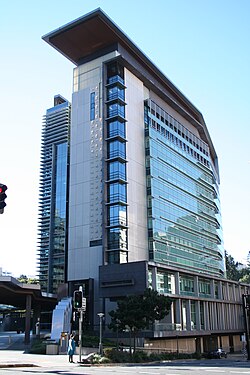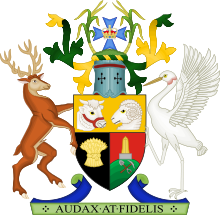
A jury trial, or trial by jury, is a legal proceeding in which a jury makes a decision or findings of fact. It is distinguished from a bench trial in which a judge or panel of judges makes all decisions.
A summons is a legal document issued by a court or by an administrative agency of government for various purposes.
The Courts of England and Wales, supported administratively by His Majesty's Courts and Tribunals Service, are the civil and criminal courts responsible for the administration of justice in England and Wales.

A justice of the peace (JP) is a judicial officer of a lower court, elected or appointed by means of a commission to keep the peace. In past centuries the term commissioner of the peace was often used with the same meaning. Depending on the jurisdiction, such justices dispense summary justice or merely deal with local administrative applications in common law jurisdictions. Justices of the peace are appointed or elected from the citizens of the jurisdiction in which they serve, and are usually not required to have any formal legal education in order to qualify for the office. Some jurisdictions have varying forms of training for JPs.
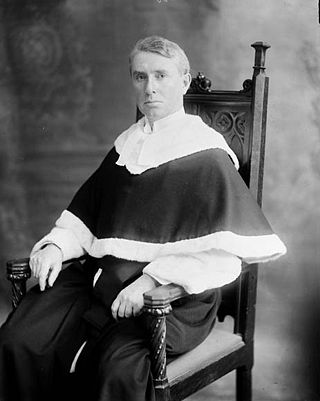
The term magistrate is used in a variety of systems of governments and laws to refer to a civilian officer who administers the law. In ancient Rome, a magistratus was one of the highest ranking government officers, and possessed both judicial and executive powers. In other parts of the world, such as China, magistrate is a word applied to a person responsible for administration over a particular geographic area. Today, in some jurisdictions, a magistrate is a judicial officer who hears cases in a lower court, and typically deals with more minor or preliminary matters. In other jurisdictions, magistrates are typically trained volunteers appointed to deal with criminal and civil matters in their local areas.
One of the six founding states of Australia, Queensland has been a federated state subject to the Australian Constitution since 1 January 1901. It is a parliamentary constitutional monarchy. The constitution of Queensland sets out the operation of the state's government. The state's constitution contains several entrenched provisions which cannot be changed in the absence of a referendum. There is also a statutory bill of rights, the Queensland Human Rights Act 2019. Queensland's system of government is influenced by the Westminster system and Australia's federal system of government.
A hybrid offence, dual offence, Crown option offence, dual procedure offence, offence triable either way, or wobbler is one of the special class offences in the common law jurisdictions where the case may be prosecuted either summarily or on indictment. In the United States, an alternative misdemeanor/felony offense lists both county jail and state prison as possible punishment, for example, theft.

The Magistrates' Court of Victoria is the lowest court in the Australian state of Victoria.

In England and Wales, a magistrates' court is a lower court which hears matters relating to summary offences and some triable either-way matters. Some civil law issues are also decided here, notably family proceedings. In 2010, there were 320 magistrates' courts in England and Wales; by 2020, a decade later, 164 of those had closed. The jurisdiction of magistrates' courts and rules governing them are set out in the Magistrates' Courts Act 1980.

In law, a committal procedure is the process by which a defendant is charged with a serious offence under the criminal justice systems of all common law jurisdictions except the United States. The committal procedure replaces the earlier grand jury process.

The judicial system of Israel consists of secular courts and religious courts. The law courts constitute a separate and independent unit of Israel's Ministry of Justice. The system is headed by the President of the Supreme Court and the Minister of Justice.

The High Court of Singapore is the lower division of the Supreme Court of Singapore, the upper division being the Court of Appeal. The High Court consists of the chief justice and the judges of the High Court. Judicial Commissioners are often appointed to assist with the Court's caseload. There are two specialist commercial courts, the Admiralty Court and the Intellectual Property Court, and a number of judges are designated to hear arbitration-related matters. In 2015, the Singapore International Commercial Court was established as part of the Supreme Court of Singapore, and is a division of the High Court. The other divisions of the high court are the General Division, the Appellate Division, and the Family Division. The seat of the High Court is the Supreme Court Building.

The Magistrates Court of South Australia is the lowest level court in the state of South Australia. The Magistrates Court, then known as the Court of Petty Sessions, was established in 1837, by the Court of Sessions Act 1837. It has both original and appellate jurisdiction and hears matters specified in the Magistrates Court Act 1991 (SA).
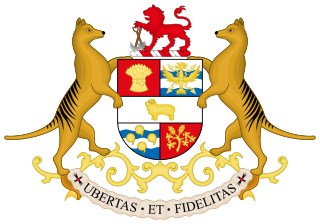
The Magistrates Court of Tasmania is the main day-to-day court in the Australian state of Tasmania and exists in accordance with the laws handed down by the Tasmanian Parliament. The Court is an inferior court to the Supreme Court of Tasmania and, in terms of the Australian court hierarchy, is at the bottom level.

The District Court of Queensland(QDC) is the second tier in the court hierarchy of Queensland, Australia. The Court deals with serious criminal offences such as rape, armed robbery and fraud. Juries are used to decide if defendants are guilty or not guilty.
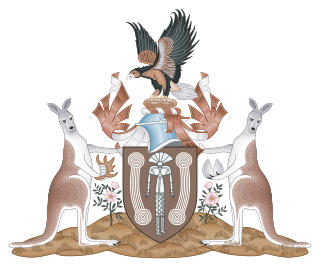
The Local Court of the Northern Territory is one of two levels of court in the Northern Territory of Australia. It has jurisdiction in civil disputes up to A$250,000, and in criminal cases in the trial of summary offences, and also deals with preliminary matters for indictable offences which are then heard by the Supreme Court of the Northern Territory. There are local courts held in Darwin, Alice Springs, Katherine, Tennant Creek, and some "bush courts" in remote locations.

The Children's Court of Queensland is a specialized court in Queensland, a state of Australia which deals with serious crimes committed by children under the age of seventeen years in the state.

The Magistrates Court of the Australian Capital Territory is a court of summary jurisdiction that deals with the majority of criminal law matters and the majority of small civil law matters in the Australian Capital Territory, the Jervis Bay Territory and the Australian Antarctic Territory.
The Virginia Circuit Courts are the state trial courts of general jurisdiction in the Commonwealth of Virginia. The Circuit Courts have jurisdiction to hear civil and criminal cases. For civil cases, the courts have authority to try cases with an amount in controversy of more than $4,500 and have exclusive original jurisdiction over claims for more than $25,000. In criminal matters, the Circuit Courts are the trial courts for all felony charges and for misdemeanors originally charged there. The Circuit Courts also have appellate jurisdiction for any case from the Virginia General District Courts claiming more than $50, which are tried de novo in the Circuit Courts.

The basis of the Bahamian Law and legal system lies within the English Common Law tradition. Justices of the Supreme Court, Registrars and Magistrates are all appointed by The Governor-General acting on the advice of the Judicial and Legal Service Commission, which is composed of five individuals who are headed by the Chief Justice as their chairman. The Chief Justice and the Justices of the Court of Appeal, including the President, are appointed by the Governor-General on the recommendation of the Prime Minister after consultation with the Leader of the Opposition. Once appointed, the salaries and other terms of appointment of the Chief Justice, Justices of Appeal and Justices of the Supreme Court cannot be altered to their disadvantage. Justices of the Supreme Court can serve until the age of 65 years and, where agreed among the judge, the Prime Minister and the Leader of the Opposition, may serve until the age of 67. Justices of Appeal can serve until the age of 68 years and, where agreed among the judge, the Prime Minister and the Leader of the Opposition, may serve until the age of 70 years. The law of The Bahamas makes provisions for the appointment of 12 Justices to the Bench of the Supreme Court, inclusive of the Chief Justice, and for five Justices of the Court of Appeal, inclusive of the President. The Chief Justice, as Head of the Judiciary, is an ex officio member of the Court of Appeal, but only sits at the invitation of the President.
